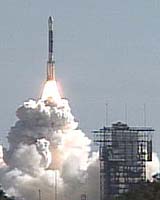Why Human Space Exploration and how to continue?
(This site will be undergoing substantial enhancements as I can get to them. I’ll be happy to entertain any and all suggestions, especially in terms of key- but not too numerous- links to other space-related sites.)
Why is space exploration- by humans- important? Because the human race, as a whole, is rapidly running out of alternatives to maintain the ‘frontier culture’ and exploratory viewpoint that looks beyond the individual. While medicine is truly the most humanitarian of frontiers, it is very much self-centered. Medicine is about extending our own lives, not so much as a benefit to society (no matter how much we claim otherwise). The physical frontiers- whether the American Expansion in the 19th century or space in the 21st – combine the individual’s achievement with that of the society, binding them as a whole.
This binding and these achievements can only go so far with robotic technology. Beyond the substantial societal need to put a human face on the frontier, the practical requirement here is far less about technology as it is about an immutable law of physics; the speed of light is constant. Can one imagine trying to control a robot on Europa (where life may be discovered under the ice) from Earth, given the absurdly slow reaction time that the speed of light would cause? And it will be a long time before artificial intelligence will be as flexible and adjustable as human for any reasonable cost. (After all, the human being is still the only super-computer that can be mass-produced with unskilled labor :) )
So manned space exploration must go forward. But how? Is the infrastructure used in past space ventures suitable for the future? I would say not. Driven by nationalistic pride, both NASA and their Soviet counterparts performed miracles up through the 70s. However, financial consideration in Russia, coupled with the tendency of large government bureaucracies to lost focus in anything but sustaining the bureaucracies in America have combined to kill the initiative and true goal orientation of both efforts. In the U.S., measuring a project’s worthiness is now based on determining the number of congressional districts that can get their share of the economic pie involved. Hardly the proper way to run goal-oriented space effort.
I believe the answer lies in the true commercialization- at a fully international level- of the effort, combining the powers of private enterprise, the specific construction talents of each space-faring nation, and the iron-clad commitment to a few specific goals:
- To reduce the cost per pound to orbit
- To reduce vehicle and station costs by standardized, repeatable components.
- To set a specific goal of establishing a significant human presence on either the Mon or Mars (or both) by a set timeframe. Pick the goals and stick by them.
- To retain and use technology that works, rather than continuously pursuing new technology when not needed. (Much of the traditional heavy-lift engineering capability has evaporated in the U.S.; retired or passed on.)
- To completely de-politicize the space effort, both internally and externally. All decisions made based on technical merits to achieve the goals above.
- To do so as safely as possible, but always recognizing that there are risks in space exploration and that simplicity nearly always aids safety.
- To cooperate and coordinate with any other remaining space efforts.
I will be glad to hear the thoughts of others on all of this.



